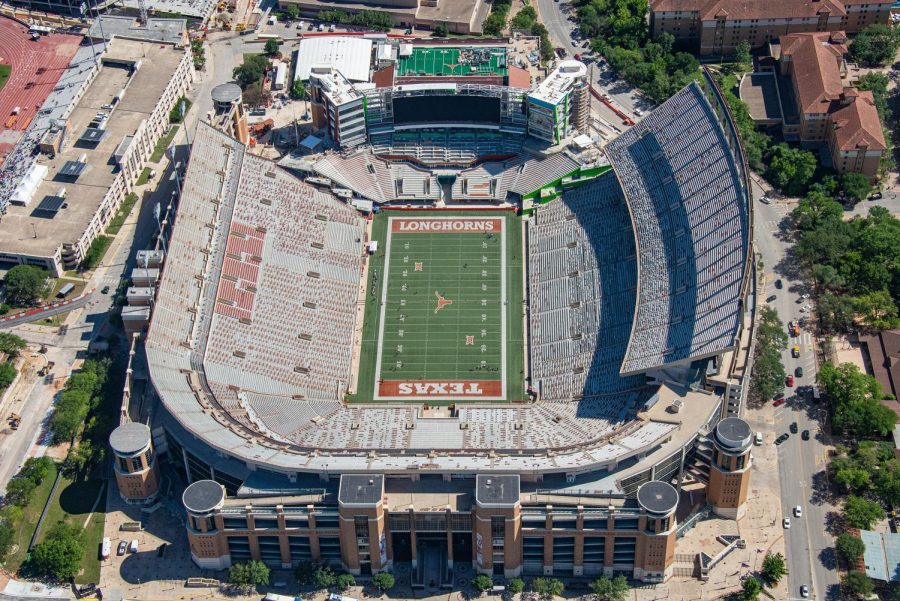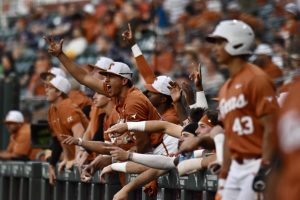New law allows Longhorn athletes to profit off name, image, likeness
June 28, 2021
Editor’s Note: This article first appeared as part of the June 22 flipbook.
In May 2020, Axios data suggested former Texas quarterback Sam Ehlinger could have potentially earned $962,000 off of his social media annually. Charli Collier, a former Texas women’s basketball center, could have also earned thousands of dollars.
Now, Texas’ next generation of future stars will soon be able to reap those rewards and profit off their name, image and likeness.
Texas Gov. Greg Abbott signed Senate Bill 1385 on June 14, allowing college athletes in Texas to earn compensation for the use of their name, image and likeness from outside businesses.
In August 2020, Texas Athletics launched LEVERAGE, a program dedicated to helping Longhorn student-athletes maximize their brand potentials and make use of their names, images and likenesses.
“I want to reassure and remind Longhorn Nation that we are prepared and have been actively engaging our student-athletes and staff for this new era of college athletics,” Chris Del Conte, vice president and director of athletics, said in his June 14 statement. “With our LEVERAGE initiative, a part of the 4Ever Texas program, our student-athletes have access to first-in-class resources and education on personal branding and brand management, business formation and entrepreneurship, opportunity management and financial literacy.”
Now, Longhorn student-athletes will be able to take advantage of the LEVERAGE program when the law goes into effect July 1, especially some of the highest profile Texas student-athletes, which does not just include the star quarterback.
Junior outfielder Lauren Burke has over 300,000 followers on TikTok, and senior linebacker DeMarvion Overshown has over 75,000.
Last Thursday, Overshown posted an image on Twitter which did rounds among college athletes on social media, that aims to capitalize off the new name, image and likeness law.
“Any local companies that want to use my social media or want me to do commercials to brand themselves, my DM is open,” Overshown said on Twitter.
The bill’s impact can also be seen from the top down, including for some of Texas’ lower-profile athletes.
“Our imaginations are like, we’re going to see Sam (Ehlinger) … selling SUVs on TV, but it also means … walk-on rowers who give the school 50 hours a week … can go get a job,” Tolga Ozyurtcu, an assistant professor of instruction in the Department of Kinesiology and Health Education, said to the Texan in August 2020, when the NCAA first voted to begin changing name, image and likeness opportunities for student-athletes.
Under current NCAA rules, student-athletes are banned from receiving any sort of compensation other than scholarships for playing college sports. With the introduction of the Texas law, student-athletes could be paid for anything from product endorsements, training lessons or autograph sessions, but direct payment from a college or university is still banned.
Also included in the bill, which overwhelmingly passed in the Texas Senate and House, is a required literacy workshop at the beginning of the first and third academic years.
Texas is the 19th state to pass such a law, partly spurred by an effort to stay competitive with other states on the recruiting side.
According to the Austin American-Statesman, one of the co-sponsors of the bill, state Rep. Matt Krause “was adamant that the bill was necessary to keep Texas in step with other states on the legislation, fearing a failure to pass the bill would harm recruiting for in-state schools.”
Texas is one such school poised to earn a recruiting advantage from the new law with its prominent social media brand. Among all college athletics accounts, Texas is the fourth most-followed on four main platforms, and Texas’ football account generated the most interactions in May.
Now, Texas student-athletes will finally be able to profit off of that brand legally, as well as their own.












